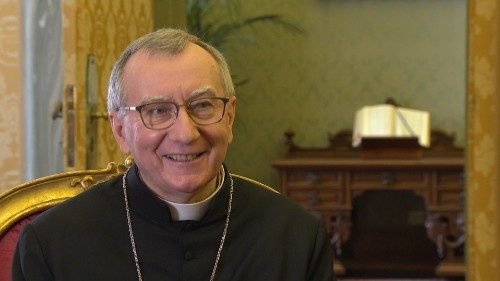Pope Francis’ 30th apostolic journey abroad takes him to Romania from 31 May to 2 June. As the Vatican Secretary of State explains, the visit will highlight ecumenical dialogue and the Christian roots of the European continent.
By Linda Bordoni
Cardinal Pietro Parolin said Romania is awaiting Pope Francis’arrival with expectation and hope. Speaking to Vatican News on the eve of the Pope’s departure, the Vatican Secretary of State said the nation is awaiting his message of encouragement and unity.
The Pope visits Romania in the footsteps of Pope St. John Paul II. The official motto of the journey is “Let’s walk together”.
Marian theme
Cardinal Parolin pointed out that the Pope arrives in Romania on the day the Latin Church celebrates the Visitation of Mary.
Pope Francis will be walking together with the people of Romania, Parolin said, in the style of the Blessed Virgin Mary: with a spirit of humility, service and charity towards the neediest.
The Pope, he continued, will be sharing the journey of all Romanians, encouraging them and affirming them in their faith while taking into account the wealth of diversity that characterizes the Church in their country.
He also wants to be there for young people so to invite them to always foster a culture of encounter which, he said, is particularly important in this historical context where divisions and contrasts prevail.
Ecumenism
Cardinal Parolin then pointed to ecumenism as one of the main features of this apostolic visit, recalling that just 20 years ago, in May 1999, Saint Pope John Paul II undertook a historical journey to the country which resulted in an unprecedented opening of doors by other nations with an Orthodox majority.
“We all remember the cry that arose from the square: ‘Unity! Unity!’ That was certainly a first step, a fundamental step,” he said.
The Cardinal said the Pope’s journey will be another step forward in this direction, working for dialogue and ecumenism.
He said that Romania is at a crossroads, where Eastern and Western Europe meet; it’s a bridge between many different cultures as manifested by its rich artistic heritage and by a history of common witness.
“There has already been an ecumenism, the Pope calls it an ecumenism of blood” he said, and its protagonists are believers who belonged to both the Catholic Church and the Orthodox Church and who suffered under the atheist regime that disregarded religious freedom and the rights of believers.
“They have already achieved unity in suffering, in martyrdom, “he said.
Religious minorities
In an effort to illustrate the various religious realities that are present in Romania, Cardinal Parolin used the image chosen by St. John Paul II when he spoke of the garden of the Mother of God, in the sense that it has much variety.
He explained that Romania is home to different communities: “think of the Latin rite Catholics of different languages: Romanian, Hungarian, Polish, Croatian … then there is the Armenian community, the vast majority of which is made up of the Orthodox and various ethnic groups, including the Hungarian one, which constitutes a significant presence”.
He remarked on the sensitivity of the Pope and his repeated call for respect for the various components, traditions, cultures and customs within the unity of a country.
“I believe that the Pope will make an appeal in this sense, that is, for respect within the unity of the nation,” he said.
This will be particularly evident, he continued, in the event which is due to take place in the Marian Shrine of Sumuleu-Ciuc, according to the motto of the journey that asks believers to overcome historical divisions and find one another in the unity of shared faith.
Christian roots of Europe
Cardinal Parolin concluded looking ahead to the message of encouragement Pope Francis is expected to bring to Romania.
He noted that the nation has experienced difficult moments in its history, including foreign occupation, a long period of dictatorship and atheism. Since 2007, he said, it has become part of the European Union and has made a significant contribution, starting with its cultural heritage.
He recalled a recent summit in Sibiu that highlighted the importance of a long period of peace that was guaranteed by the European Union, as well as the prosperity and the progress that this has brought.
He said Pope Francis will certainly recall the founding values of Europe and its Christian roots, because these values – the dignity of the human person and solidarity – find their firmest foundation precisely in a Christian heritage of which Romania is also a bearer.



